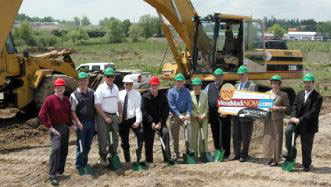ONTARIO SPOTLIGHT
There Are Incentives,
and Then There Are INCENTIVES
and Then There Are INCENTIVES
Ford Motor Co. of Canada Ltd., which has a significant US$953-million redevelopment plan for its Oakville, Ont., campus in the works, has been assured of the Ontario funds, and now awaits an equivalent amount of aid from the Canadian government. However, both provincial and federal officials want to see Ford keep open operations in the Ontario
 |
| In May 2004, officials broke ground on the 270-acre (109-hectare) CommerceWay Business Park in Woodstock, Ont., offering lots along heavily traveled Highway 401. Located half way between Toronto and Detroit, and within a two-hours drive of four international border crossings, Woodstock has already seen major 2004 investments from KYJO Steel (a custom machine shop manufacturing facilty), Jeamar Winches (a distribution center) and Woodstock Stampings (a 30,000-sq.-ft. [2,787-sq.-m.] manufacturing expansion). Key to most of these projects has been a reduction in the tax burden on "large" industrial companies by eliminating a heavier tax levied on companies occupying more than 125,000 sq. ft. (11,613 sq. m.). |
"I'm confident that we're moving forward, not just in Oakville but across the province," Cordiano says. He says the Ford plan involves a greater level of innovation, upgrade of skills, greater research capacity and improved energy efficiency on the part of Ford, in addition to an entire parts supply spinoff effect. "These are going to be legacy kinds of investments we're making, which accrue benefits to all Ontarians," he says.
Early in 2004, Canada's International Trade Minister Jim Peterson told Site Selection that Canada would continue to be reluctant to play the incentives game: "We are very much against becoming engaged in a race to the bottom." Asked whether the new automotive program runs counter to Peterson's notion, Cordiano says, "Governments invest in infrastructure, education, health care ... in those things that will make us more compet itive, mainly through our people. Part of what we are doing in the auto sector is just that. It's not like writing a check to Company A or B and saying 'Come to Ontario and we'll subsidize you directly.' That's not what we're all about here. It really is legacy investing."
Cordiano sees it as a natural development in a worldwide competition that demands resources, in all sectors, be used in the most effective manner. "Investments made today," he says, "come back in multiples."
His argument could be glimpsed between the lines of another Conference Board report, issued in October 2004, which called for the country to be more open to best practices of other nations.
"Openness includes increasing competition and encouraging foreign direct investment, being more receptive to innovative ideas and further integrating into the world economy," wrote Anne Golden, president and CEO of the Conference Board.
Such a shift is going to take some time, though.
"Canadians and Canadian businesses generally dislike the idea of incentives at all," says Gregg Wassmansdorf, vice president of corporate services and site selection practice leader for Colliers International (www.colliers.com/siteselection). While based in Toronto, his business usually takes him to other global locations besides his home province. That experience gives him a unique perspective on its advantages and challenges. He finds it ironic that the general perception of Canada is as a "socialistic" territory, yet government help for projects is more prevalent in the U.S.
"The preference here is to just improve the business climate overall and let business respond," he says. "We see it especially in areas of the economy that have traditionally been highly regulated, like railways and airlines. Canadians are fully fed up, and want to see more deregulation. In airlines and aerospace, people don't want to see targeted subsidies, people want to see Canadian businesses compete on an even footing. The idea of the government trying to pick sectors or pick winners and losers is not well-received.
"Having said that," he quickly adds, "I think it's understood that although maybe not fully accepted, the government can play a key role in supporting catalytic investments in public and private infrastructure, or public and private investment. For investments that will have a strong multiplier or ripple effect, automotive is one of the best examples you can find. The Magnas of the world are fundamentally responsive to their customers. Their whole business model is about being responsive to their customers. If that means their assembly plant is built in Windsor or Lordstown [Ohio] or Huntsville [Ala.], whether it's Intier or Magna, the supplier will respond to the location of that primary investment."
In other words, incentives are viewed as "a necessary evil" by Canadians, he says, to bring about the level of investment the country and the province need. And the necessary economic good that incentives will engender makes them swallow their displeasure.

